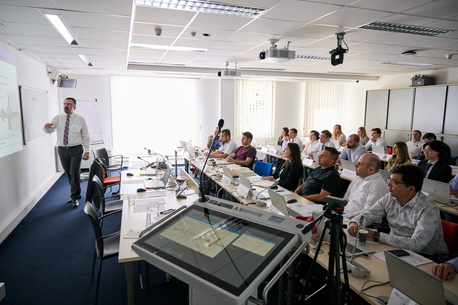- English | Русский

For the first time, the IMF’s Financial Programming and Policies (FPP) course was delivered in a blended format, structured in two phases over four weeks. The initial two weeks (July 10–21) combined asynchronous self-study lessons with virtual instructor-led discussions and lectures. In the second phase of the course, the participants attended in-person delivery at the JVI from July 31 to August 11. The course was attended by 28 participants from 14 countries, representing mainly central banks and ministries of finance.
Compared to the standard FPP course, several innovations were introduced in this pilot blended delivery. First, the extended learning period allowed participants to consolidate their basic knowledge before the in-person segment in Vienna. The virtual segment included online self-paced learning with interactive modalities on the modernized Moodle platform, revamped reading materials, and seven synchronous sessions for reviews, debriefing, exercises, and Q&A with instructors.
Second, shifting the coverage of macroeconomic accounts to the virtual phase enabled streamlining the in-person segment to focus more on the forecasting and analysis aspects of hands-on workshops. Further, learning contents were updated and upgraded. All lectures were revised in terms of content (new examples, recent research), but also in terms of design. The workshops again used the Georgia case study, but the database was now updated to 2022, so that participants were able to focus on the most recent issues and challenges during the practical work. The updated case study also improved on behavioral relationships and introduced the concept of estimation vs. calibration in macro forecasting.
Third, a negotiation simulation exercise was introduced to enhance participants' experience with program scenarios. After completing the baseline scenario, participants were divided into small teams of five or fewer members and engaged in a role-play discussion on a financial program (some playing country authorities, others IMF teams). They were provided separate guidance briefs on their objectives and constraints before the discussion. Such a simulation exercise enabled rich exchanges and facilitated learning as it enabled participants to employ the knowledge gained during the course in an exercise that resembles a real-life situation. The course was completed with participant presentations on the outcome of the discussion simulation, i.e., the agreed financial program or the reasons for the failure to reach an agreement on an adjustment program.
Participants were quite active and engaged, especially during the discussion exercise and group presentations. They found the course very useful for their work and highly rated it. Lessons learned from this pilot delivery of the FPP in a blended format will be very useful in further improving this flagship course in the IMF training curriculum for future deliveries.
Rilind Kabashi, Economist, JVI